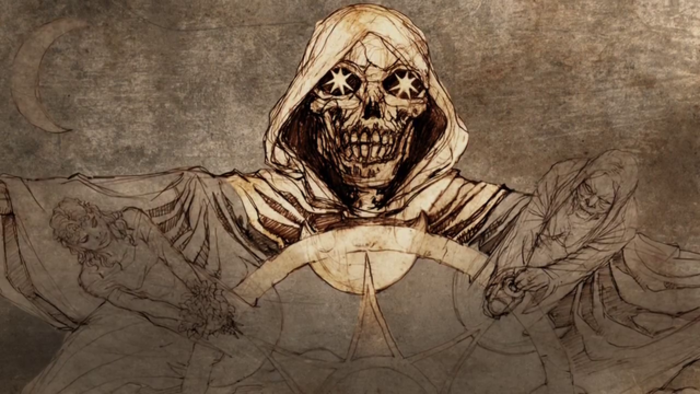
From GameofThrones.Wikia.com, with permission from HBO
When I first heard the title of episode four, “Book of the Stranger,” I thought it meant there would be a lot of deaths. We now know that is not the case, and my first impression was probably a bit too literal.
So how, then, did the show use the concept of the Stranger? Let’s examine it on a case-by-base basis.
The Origins of the Stranger
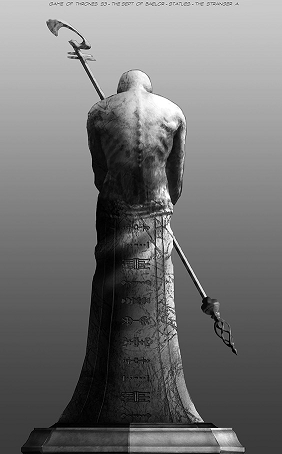
Concept art for the statue of the Stranger from GameofThrones.Wikia.com
First, though, we should start with some background.
The Stranger is one of the seven gods of the new(er) Westerosi faith, and he represents death and the unknown and is sometimes invoked by outcasts. I say “he” but, in truth, the Stranger is really neither male nor female, and the god is often represented in statues as an animal/human hybrid. Like the example above, the Stranger often faces away from the worshiper, hiding his face and remaining in shadow, and if you look closely in the various Great Sept of Baelor scenes, you can see the Stranger’s statue is definitely doing this.
George R.R. Martin most certainly got his idea for the Stranger – and for the six other gods – from mythological and literary archetypes in our own world. The Stranger is a particularly interesting one, as it is a very old archetype that has been re-used in many ways in more modern times. Its use in Jungian psychology is particularly helpful here – the Stranger in Westeros corresponds to the Shadow in Jungian terms. It is that part of ourselves that we repress in order to live and play nicely with others. It is our most basic animalistic instincts, our most selfish impulses to exclude and fear the Other, and it’s usually not what we consider our most flattering side. The Jungian psychological approach says that in order to become truly healthy, one must recognize and accept the Shadow/the Stranger as part of oneself; we must integrate all the different archetypes that we embody.
The High Septon
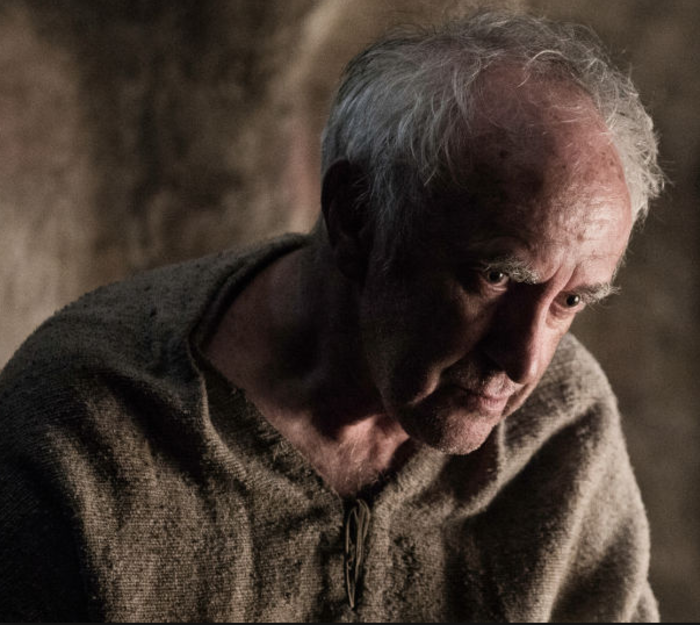
The most literal reference in the episode is the conversation between Margaery and the High Septon, wherein the queen tells her captor that his personal story sounds an awful lot like what is in the Book of the Stranger from the Seven-Pointed Star, their holy text. The High Sparrow says it is similar, and then explains how he discovered his life’s mission and his embracing of a permanent outsider status: he remains poor, knowing full well it will endear him to the smallfolk and alienate him from the privileged, ruling classes.
The High Sparrow, ironically, does not acknowledge the fact that he now wields a tremendous amount of power – the same kind of power as the lords, the kind of power he was striving for when he was making expensive shoes for the rich. We presume that he thinks his religious intentions make it acceptable to seize and use such power; nonetheless, his intentions both then and now will result in the same outcome. Maybe he didn’t learn, even though he now thinks he has.
There is a final parallel between the High Sparrow and the Stranger: he’s a literal Stranger to the aristocrats and the audience alike – we still don’t even know his true name. Who is he, really? Why is he there? He is an unknown quantity that the lords have underestimated time and time again.
Sansa Stark
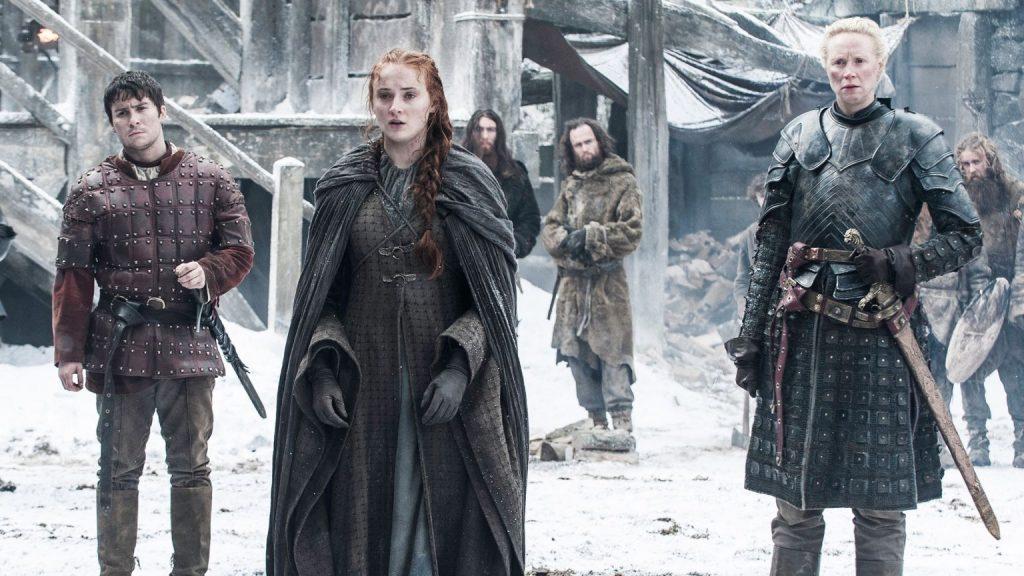
Sansa is, of course, a stranger in Castle Black to all but Jon – and one could even argue that the both of them have changed so much that they are, in many ways, strangers to each other. More specifically, in this episode we see Sansa accepting the mantle of leadership, insisting that they take back their home, which means she is going to have to embrace the rage, the violence, and the selfishness that her youthful daydreams of chivalrous tales never included. She was so sure she’d end up as someone’s wife, waiting at home in silken clothes that took a peasant a year to make while her noble husband went out and acted in the world. Now she is going to get her hands dirty – and she is more than ready.
She is being selfish by expecting others – the wildlings and Stark family bannermen – to sacrifice themselves to help her achieve her goal; she believes it is her right to expect the Stark loyalists to help her, and, furthermore, she demands that Jon expect the wildlings to follow him because they owe him their lives. (Such selfishness is at the core of the Stranger, but by taking action to regain her home, she will also, ironically, be embracing the mask of the Warrior/Hero – something that is typically reserved for men in her culture.)
She represents the outcast facet of the Stranger in many ways: by merely being a woman; by being the daughter of a supposed traitor; by having been married to two different outcasts herself – a dwarf and a bastard. What’s more, throughout the show, she has been routinely treated as an outcast, which means she has been treated as a plaything, an object, a tool, an extension of someone else, and a recipient of whatever emotion the men around her needed to unload. Now, by asserting herself further, she is consciously taking on that role of outcast and integrating it.
Jon Snow
Jon is also struggling, but in the opposite direction as Sansa: he wants to move away from conflict, confrontation, and his dark side. He is basically trying to find a new direction in his life. His instinct to protect his home and his family, that instinct he rejected when he chose the Night’s Watch, has reared its head again. He rejected it for so long that he is struggling to wrap his mind around it, and the irony is probably not lost on him that he has come full circle.
Jon, now, is a stranger to Sansa, and maybe even a stranger to himself after his resurrection. One thing he does still know is what it means to order people to die for his goals, and it is an incredible burden for someone with a conscience – exactly what he was trying to express to Sansa, and maybe why he is so exhausted from his journey. He has been alternating between playing the Stranger as an outcast (a bastard, a new recruit to the Night’s Watch, a crow in the midst of the wildlings) and playing the role of Warrior/Hero (as the lord commander, defender of his friends, maker of peace with the wildlings), and the latest part of that journey makes him more representative of the former than almost anyone else on the series – he did come back from the dead, after all. It doesn’t get any more literal than that.
Although Jon’s poor noodle is totally scrambled right now, and it’s hard for him to process everything that is going on both around and within him, we, like Sansa, want him to continue fighting. As time passes, I think we will see Jon fully integrating those positive and negative aspects of himself and embracing this new path.
Petyr Baelish
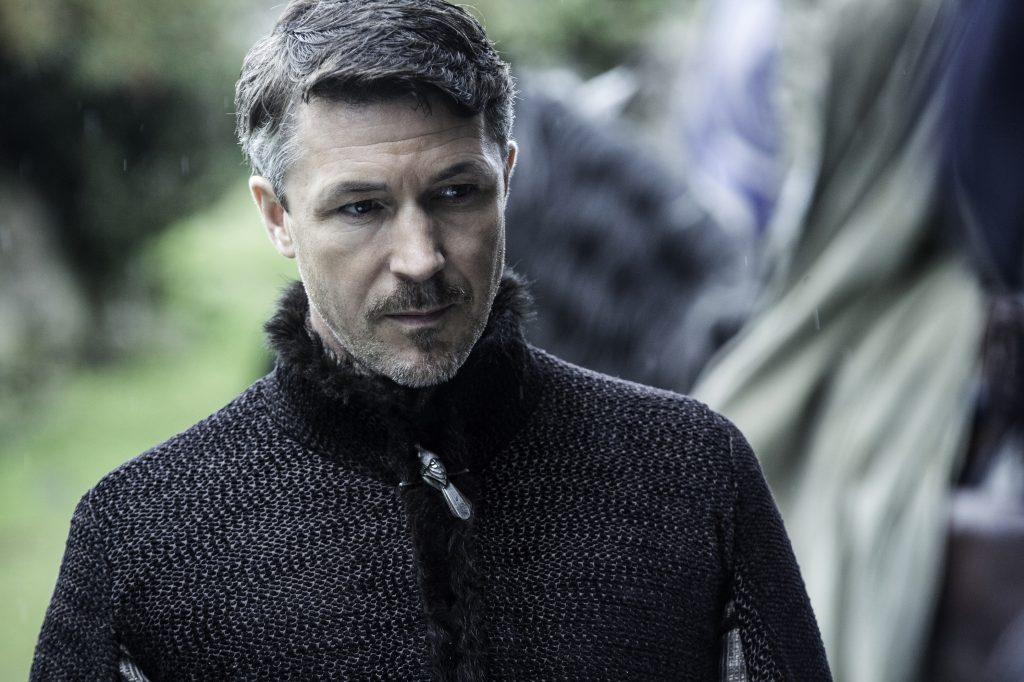
Littlefinger’s manipulative behavior is so self-serving, so venal, that his actions embody those worst instincts of self-protection over the welfare of others – even others he purportedly cares about. For example, he gave Sansa over to the Boltons without thoroughly vetting what kind of situation he was putting her in, without discovering that Ramsay was a sadist (according to the actor and the producers). Not that this excuses him from being perfectly willing to use her and her virginity to further his own goals, of course.
Obviously, Littlefinger has never had any problem with acknowledging the Stranger within himself. His struggle is the opposite, actually – to find the Warrior/Hero within himself. Maybe his decision to take the Vale’s troops north to help Sansa is part of this process. Oh, who am I kidding! This guy will never be integrated, and he will continue to let his Stranger flag fly. Anything else he appears to be is definitely a mask.
Cersei and Jaime Lannister
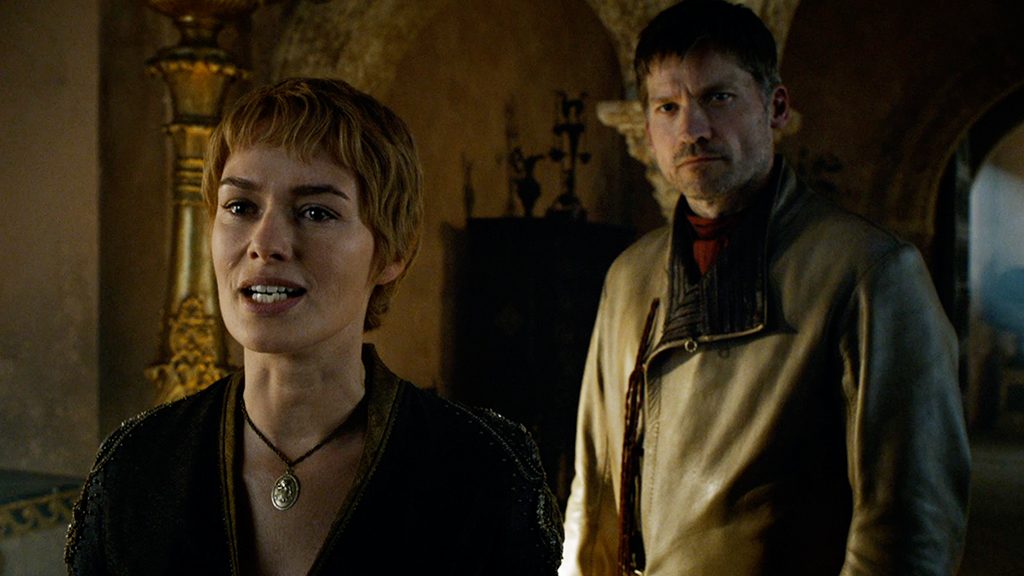
All of Cersei’s actions seem to be self-serving and come from the Shadow within. She justifies this by adopting an utilitarian approach, saying it is for her children and her family. Regardless of her professed motivation, however, the result is the same – making her, ironically, identical to the High Sparrow.
Jaime, on the other hand, has been on a multi-season journey that wavers back and forth between the Warrior/Hero ideal and the Stranger’s base instincts. Currently, he is back under Cersei’s thumb and fearful, as is she, of losing their only remaining child. Nothing brings out the Stranger and our worst impulses like fear.
Tyrion Lannister
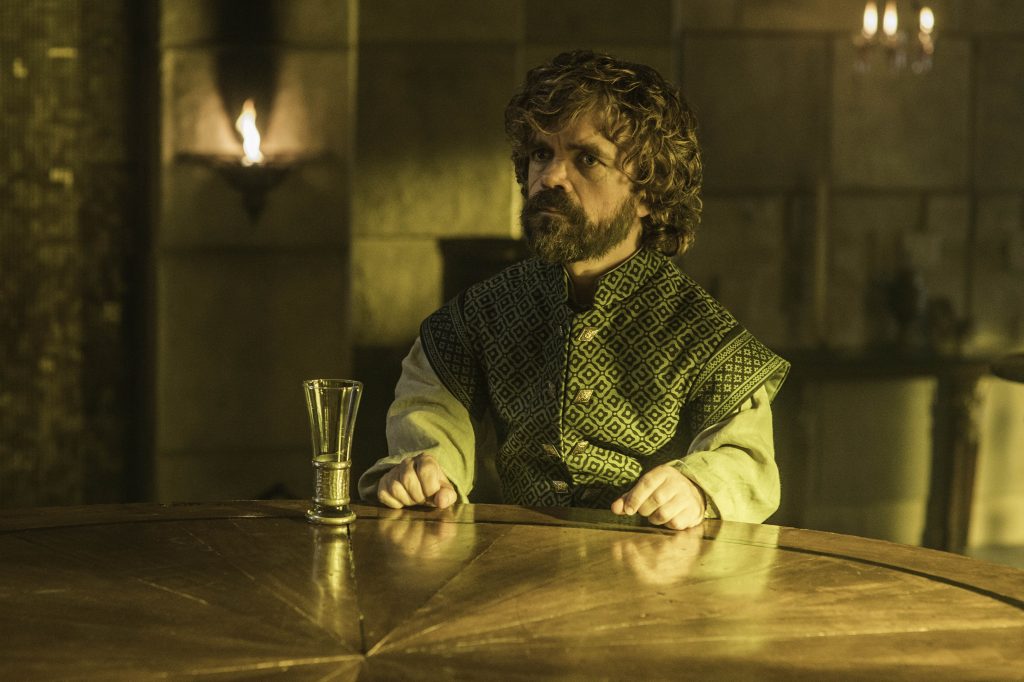
The Meereen storyline is the Stranger writ large.
Tyrion understands that you have to accept some darkness in order to make political compromises. It ain’t pretty, and it ain’t fun, but it is self-preserving, even if it often comes at the expense of others; in any political compromise, someone, somewhere, will get the shitty end of the stick, and it is usually those who lack any kind of representation and who are, thus, the most vulnerable (such as slaves, children, and immigrants).
This is the perfection manifestation of Tyrion as an individual: he is fairly well-integrated, and he knows when it is time to wear the mask of the Warrior/Hero (as Missandei and Grey Worm urge him to do) and when to let the the Stranger out – although, like Jon, he oftentimes feels guilty about what he must do when channeling the latter. (He also is the very epitome of the outcast, tying him to the Stranger even more thoroughly.)
Theon Greyjoy
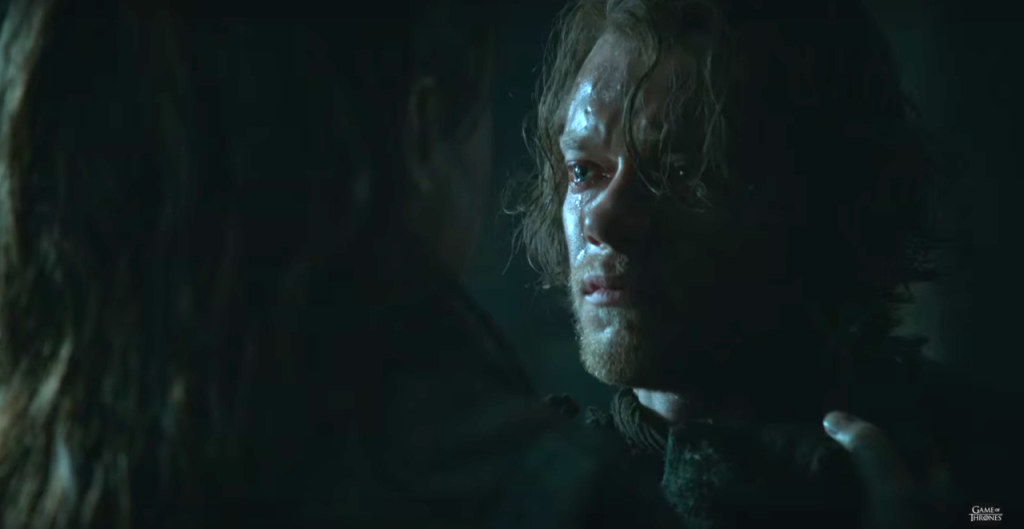
Theon – until this episode – is another outcast, one who has no real home; he was never really a part of the Stark family, he was rejected by his father (and the rest of his people) when he returned to his childhood home, and he was a prisoner subjected to repeated physical and emotional torture. During this last period, while under Ramsay’s thumb, he was forced to live completely in the shadows, retreating to his most basic instincts, becoming the Stranger personified. If he had to eat rats alive (as in the books), sleep with the dogs, reject his sister’s offer of rescue, or watch someone he cared about get raped, he did it, all in the name of survival. (Not that these things didn’t disturb him – they clearly did, as we could tell in his final conversation with Sansa before leaving to return to the Iron Islands.)
Theon is a person climbing out of the Shadow, beginning a slow transition from the Stranger to the Warrior/Hero. He will never be the ideal Warrior, with sword and strength and rectitude, but he nonetheless now intends to do the right thing, as evidenced by helping Sansa escape or, in this episode, throwing his support behind his sister to rule the ironborn.
This new-and-improved-yet-damaged Theon is a far cry from the child that left the Iron Islands or, even, from the man who last visited Pyke, back in season two. He is a Stranger in his own home, desperate to be belong again.
Brienne of Tarth

As a woman who dresses like and fights against men in a male-dominated society, Brienne has never felt comfortable anywhere except in a good fight. As a result, she is a Stranger to everyone, no matter where she goes; one need not look any further than the reactions she gets any time she arrives at a new location.
In this episode, Brienne makes sure that Davos and Melisandre know it was she who took Stannis’s life, and that she has not forgiven Mel for the blood magic that killed Renly. She announces her revenge with no shame, but what is revenge? It doesn’t help the dead – only the living. There is an element of selfishness implicit in Brienne’s actions. Indeed, she has killed quite a few people in her goal to be an honorable knight – that is to say, one who does the right thing in all cases – and while most of those people deserved it, it still doesn’t mean that her motives are always entirely pure.
Ultimately, Brienne craves the role of the Warrior/Hero because it fulfills something she lacks: belonging.
Daenerys Targaryen
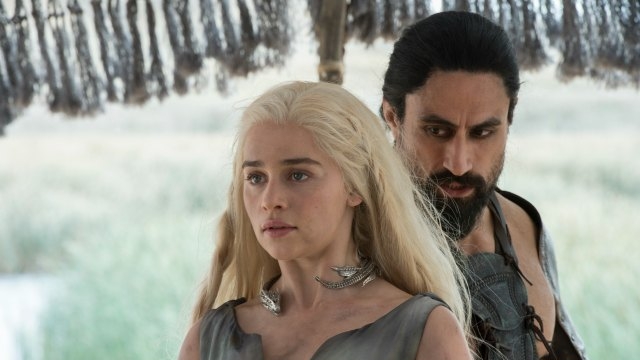
Both throughout the series and in this specific episode, Daenerys has been a bringer of death. This is a side of herself that she had to embrace in order to survive, to help the plight of the slaves in Slavers’ Bay, and, finally, to overcome the khals who rejected her offer to lead them, as she most certainly knew they would. She is the outsider who comes in and turns things upside down, that destroys tradition.
Is her goal selfish? Yes, because why should the Dothraki people care about who sits on the Iron Throne in Westeros? Is she using them as a means to an end? Absolutely. Everyone has the Stranger in them, and Dany is no different, no matter how noble her intentions might be (to free the slaves or to bring justice to Westeros). Oddly enough, she is both the Stranger and the Warrior/Hero, much like Jon; her story appeals to so many because she is growing into her full power and is now the one doing the rescuing instead of needing rescuing herself.
Ultimately, the Stranger is not just a simple symbol for death or an aspect of our psyches that needs integration – it is also the quest a person undertakes in life. Like the High Sparrow’s story and, apparently, the Stranger’s chapter in the Seven-Pointed Star, the Stranger’s journey is about revelation, and how that revelation informs what choices we make and what paths we tread. Of all the characters on the show, only three have had breakthroughs of this nature: Jon, Sansa, and Dany. All three have been growing and changing, becoming stronger and more integrated throughout the story.
“Book of the Stranger” not only moves the plot forward, but it also substantially develops the characters in very satisfying ways. Indeed, it showed us another type of revelation: that we are hurtling towards the endgame.
It turns out the the Stranger is not only in us all – it is nigh unto the show as well.
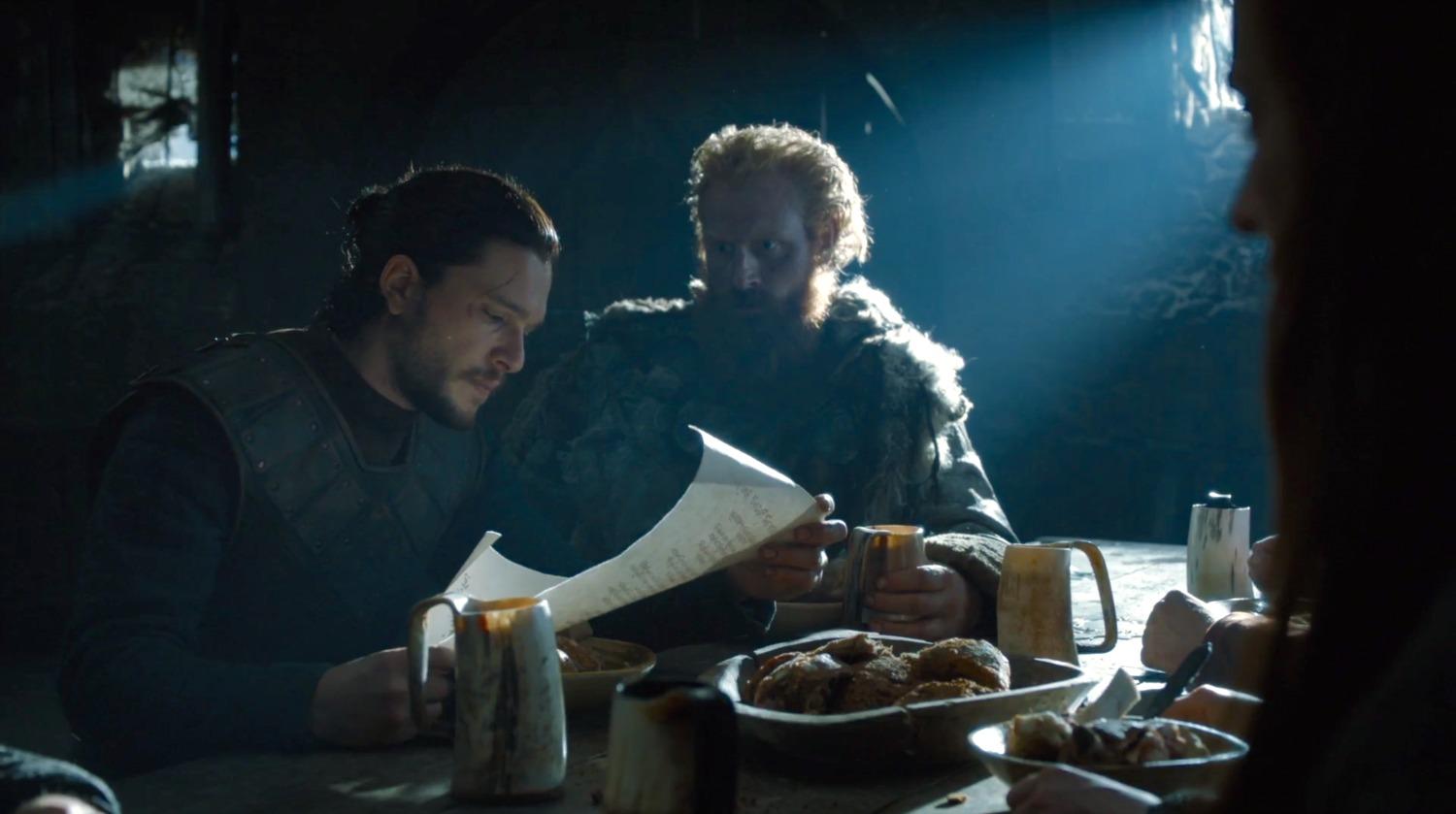
Hodor!!!
Hodor?
Hodor is also a Stranger, because Hodor.
The complexities of the human psyche are intriguing and I find GRRM’s work both fascinating and brilliant. He really did his homework on so many levels of his writing. It’s no wonder it takes him years to produce a book. Having a writer in our family I can vouch for the amount of intense research that is put into writing a single book.. I can not imaging the amount of time and effort it would take to write a series of novels that encompass such depth and clarity. I have much much much respect for GRRM’s work and this will always outweigh my angst at him taking so much time to get the books complete. Yes this last book I would agree was probably delayed for personal fun and adventures he denied himself in earlier years (perhaps couldn’t afford such luxuries). But either way we have gained a masterpiece of work that I think will take years of analysis and deep thinking to really be appreciated in its entirety.
Excellent analysis. It was an intriguing episode title, and an absolutely fantastic episode.
I think that the best work ever that I’ve come across in my life that utilised the concept of the Shadow was Planescape: Torment.
It came out in, what, 1999? And I still shudder when I hear the question, ‘What can change the nature of a man?’ And the answer– Oh, the answer.
Brb, gotta find a Let’s Play….
Patsy this is an excellent look at the Stranger and how its manifested in each character.
Really, revenge is what is driving so much of the characters’ actions – and the fight between loyalty and selfishness and self survival really comes in to play. We as viewers want these characters to be successful in their quest for revenge. That desire for revenge and the happiness that we get when it happens is perhaps i the stranger in us.
Now, curiously of course The Hound’s warhorse is also called “Stranger”.
Oh, thinking more on it – Id assume the epitomy of the stranger would be the White walkers. In the books after all they are called the Others. Is the stranger necessarily evil, or self serving? Or are they the Stranger personified? (hee if that is even the right word for we can’t exactly call them persons, can we?)
A superb article, but how not to include Arya in an analysis of The Stranger?!!
Oh, right – that ties in to the stranger as mask, our other self perhaps, as she struggles to become no one?
This is really well-done. Great read!
Great and insightful article! Enjoyed reading it.
SaveTheWolves,
I think Dame Pasty focused on the characters that appeared in this episode. As in trying to explain its title.
Awesome analysis. But still, I think that’d be giving D&D way too much credit.
Thank you all for the positive feedback but credit must also be given to Marc N. Kleinhenz, he edited my post and really improved it.
ash,
Excellent point about our joy in seeing revenge being representative of the Stranger and I agree wholeheartedly. In regards the WW, the use of the term The Others is absolutely part of this theme from the books. They are THE thing to be afraid of moreso than other threats…fear of the unkown and the foreign is at the heart of the Stranger/Shadow archetype. And there are tons of other things from the books like The Faceless Men (they are literal representative of the Stranger/Death), Arya’s attempt to be noone (which means rejecting her personal goals of revenge to become a passionless killer for hire), The Hound’s horse being called Stranger (is a clue that he is an outcast, not that we needed much more proof of that but still important to the theme). I could probably write a thesis on this theme using book material. 🙂
JoffreyTrueKing,
Awww, c’mon now! Benioff and Weiss met while attending Trinity College Dublin where they studied Anglo-Irish literature (Joyce, Beckett, etc). Benioff earned a Master of Philosophy in Irish Literature and Weiss earned a Master of Fine Arts in Creative Writing. I earned my Masters in a very different area but I have an inkling of what they probably had to do to earn those degrees so their credentials are nothing to scoff at. I’ve definitely noticed that the eps they write always have very strong, coherent themes whereas the other eps by other writers while good are not as thematically sound.
Wow, you certainly know how to squeeze the metaphorical juice of a story. Great read, I look forward to any next analysis 🙂
well then, Kudos to both of you! And given how many book references you are making, one could say thqat D&D are using their background to bring as much of Martin’s idea to the screen as possible. And I agree – Im pretty satisfied with their episodes (even if I am frustrated by some decisions that they make…) They know there stuff
Yes, those fears seem part of human nature, one of the reasons we keep going to war, dammit all. But I wonder if the war against the WW is the one true good war (if there is such a thing)
Is the Stranger necessarily evil? Is there another of the 7 that would better represent that concept?
I really want to talk more about this and hope the conversation continues – lots of ideas to think about.
ash,
According to Jung the Shadow/Stranger is not necessarily evil. It becomes evil when a person refuses to examine their Shadow, then projects that Shadow on others and acts to harm others based on those projections. Scapegoating is an example of this phenomenon. In most instances scapegoating leads to nothing more than harsh words spoken, but in far too many other cases the result can be anything from discrimination to genocide. Ultimately, Jung’s concept of Evil and Good are not absolutes but they are possibilities based on a continuum of how well someone is or is not “integrated”. I think it’s safe to say that George R. R. Martin feels the same way since most of his characters are so “gray” and none of them develop in a straightforward fashion. Instead they progress in fits and starts and in many cases regress (as I believe Jaime is now doing). Contrast his approach to good/evil with Tolkien’s. The only character IMO that had any real internal conflict (grayness) in them was Gollum. If Martin had written LOTR the story would have been chock full of Gollums, some better, some worse, and all proceeding at different speeds and paths and all meeting their denoument at different points on the scale of good/evil. So the simple answer is no it isn’t necessarily evil IMO. 🙂
Great analysis of what the stranger stands for and how many characters are strangers in one way or another. I really enjoyed reading it and I agree that it is something which reflects in GRRMs grayness of most characters.
Hi Patsy
I REALLY enjoyed your thoughtful post! I did have a question on the portion on Sansa. There’s a mention of her selfishness to expect the Stark bannermen to come to her aid to take back Winterfell as well as the Wildlings. While I agree by our cultural standards that might be true, it seems that for her society, it is a reasonable expectation.
So I guess it gets into the whole “can we impose our cultural standards on others” argument which gets further complicated by the whole “1/2 of this is an imaginary realm” consideration but based on the culture we’ve seen around her, it seems reasonable versus selfish based on the standards of that world.
Would love to hear what you think! And I know things sometimes don’t come across well in comments so please understand this is by way of debate and not criticism :-).
It is an interesting take on it, but in almost all of the reviews we seem to miss the exact quote from the Book of the Stranger, the one said by Margaery. I need to rewatch the episode, but it was something about walking through the graveyard and realizing your sins, or rather being honest to yourself about it. High Sparow has his take on it, but question is if he is really honest, because with his zealotry he seems to be deceiving himself. So in that light, Sansa has to come to terms with what happened to her in Winterfell and that she is not really a damsel in distress, although she tried hard to be just that, John is not a crow, although he tried to be, Dany is not breaker of chains or whatever, she is Targaryan and they ain’t fluffy, Theon is not pure ironborn, he has a stark taint and whatever else what happened to him, Mel has to find new prophecy crush (here we go again), Brienne generally is not sure in herself as a knight woman, etc. That is basically what Arya is repeatedly asked, who you really are.
Roocat,
That’s a fair question you ask about the differences in cultural norms. And this kind of thing did occur in real medieval time so there’s no need to dismiss it because the show is technically high fantasy. It did occur to me while writing that portion about Sansa and Jon that some would object to say that it isn’t selfish. Sansa and Jon are justified in expecting the help (the bannermen do owe allegiance and the wildlings do owe Jon their lives). At the same time, Sansa and Jon wouldl be asking many to give up their lives for a cause from which they and their families may not benefit–certainly not in any immediate way. And there is no guarantee that Sansa and Jon would ever be able to repay them or make it up to them. And because there is no guarantee of fair compensation for their sacrifice, I believe it is selfish. I think Jon recognizes it and that’s why he’s reluctant to ask the wildlings to fight for the Starks. Whether they owe him their lives or not is immaterial to him.
Alternately one could make the argument that the Feudal system, on which this is based, was an inherently flawed system that was too heavily weighted in favor of the nobility–the social contract in this case was unfair in terms of individual liberty and economic distribution.
And one last point, I don’t think concepts of reasonable and selfish are necessarily mutually exclusive. I believe it is possible to be reasonably selfish. Or is that too much of a non-answer? 🙂
Lumatrix,
Good points and why I specifically mentioned the concept of revelation, confronting, accepting and integrating some aspects of the Shadow/Stranger. The three most obvious characters experiencing a revelation about who they are are Jon, Sansa and Dany (the 3rd paragraph from the end) but it certainly can be applied to others as you so aptly noted.
I really loved this analysis, I would really love to read similar of the other six 🙂
Fantastic piece of writing. I thoroughly enjoyed reading. Thank you so much 🙂
That is really great analysis. I’ve recently read a blog review of this episode and the author was really not satisfied with this title, saying that it has almost no connection to the scenes. Now I can prove him wrong.
Someone pass the wine please. I think I know things now. Must drink to forget that thought…
SweetTrix,
this
Ice Spider,
Nicely put move over JRRT for the king GRRM. Bet the bible was easier to write! And this should be a bible for all high fantasy. As it should be fantastic and fanantic..